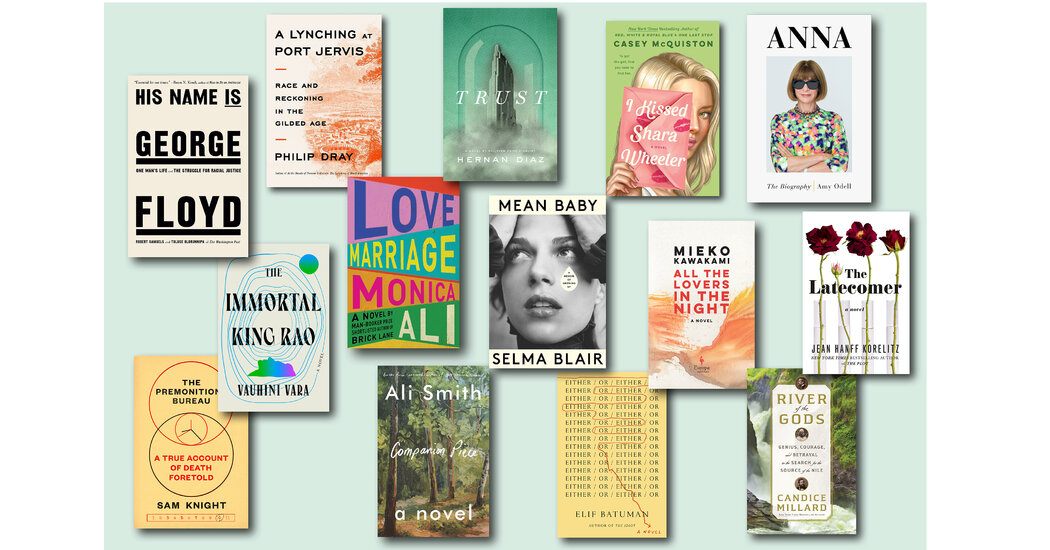
‘All the Lovers in the Night,’ by Mieko Kawakami. Translated by Sam Bett and David Boyd. (Europa, May 3)
Kawakami, already celebrated in Japan, has built a following among English readers for her earlier novels about the lives of women, “Breasts and Eggs” and “Heaven.” Here she focuses on a shy proofreader who is coaxed out of her solitude by a physics teacher — andconfronts unsettling episodes from her past.
This biography of the longtime Vogue chief draws on hundreds of interviews, tracing Anna Wintour’s path from 1960s London to the most powerful position in fashion journalism.
‘Companion Piece,’ by Ali Smith (Pantheon, May 3)
Smith, whose recent Seasonal Quartet novels took on real-life events like Brexit, the election of Donald Trump and the wildfires in Australia, has now written a pandemic-era story. A woman receives an unexpected call from a former classmate asking for help deciphering a puzzling interaction, and from there, Smith spins out a broader story about loneliness, refuge and freedom.
‘Either/Or,’ by Elif Batuman (Penguin Press, May 24)
“The Idiot,” Batuman’s debut novel, introduced Selin, a bookish Harvard freshman, the daughter of Turkish immigrants and an avatar for Batuman herself. In this follow-up Selin — now a sophomore and trying to decipher her relationship with an older math student — works out her ideas about sex, autofiction (André Breton figures heavily here) and what it means to live an aesthetic life.
Two Washington Post journalists, building on a series of articles, offer a fuller story of Floyd’s life, setting out to “pull back the curtain on the lifetime of striving that had come before, and to understand the heartbeat of the historic movement for civil rights that followed.”
‘I Kissed Shara Wheeler,’ by Casey McQuiston (Wednesday Books, May 3)
McQuiston’s earlier novels, “Red, White & Royal Blue” and “One Last Stop,” have been celebrated for their focus on queer love stories. Now, in a Y.A. romance, McQuiston explores the lives of high school students in Alabama, beginning with Chloe, who is set on becoming valedictorian and is thrown off-kilter by an unexpected kiss — and the romantic entanglements it brings to light.
There are a few essential things to know about the world of this debut novel: The American government has been replaced by a corporation, and a climate crisis is ravaging Earth. Into this mix comes Athena, the daughter of King Rao, a tech C.E.O. In an effort to help reverse damage to the planet, she tells his story, from his 1950s boyhood on a South Indian coconut farm to his political and professional ascension.
‘The Latecomer,’ by Jean Hanff Korelitz (Celadon, May 31)
The Oppenheimers are comfortable in their Brooklyn home, but they’re not happy: Salo, haunted by a car crash from his college years, is stirred by art, and not much else; his wife, Johanna, wants nothing but a cohesive family. When their triplets prepare to leave home, she decides to have a fourth child, bringing long-held secrets to the forefront.
‘Love Marriage,’ by Monica Ali (Scribner, May 3)
Save the date: Yasmin, a daughter of Indian parents who’s studying to become a doctor, and Joe, a white man whose mother is a well-known feminist, are getting married. As their families come together ahead of the wedding, new relationships are forged and bonds are broken.
In 1892, Robert Lewis, a Black man, was lynched in New York after being accused of assaulting a white woman. It forced the North to consider its own endemic racism — lynching was not only found in Southern states — and caught the attention of the journalist Ida B. Wells. Dray, a historian, draws parallels between the era and present-day America, including the Black Lives Matter movement, police brutality, the Capitol riot and more.
As an infant, Blair was known as a mean baby, thanks to a scowl and a judgmental, scrutinizing face. In this autobiography, Blair — known for roles in “Cruel Intentions,” “Legally Blonde” and others — traces the arc of her life and career, including her relationship with her mother, her “first great love”; her substance abuse; and her diagnosis of multiple sclerosis.
In the wake of a coal mine avalanche in Wales that killed dozens in 1966, a psychiatrist named John Barker, convinced that supernatural signs preceded the disaster, began soliciting personal stories of premonitions. Expanding on an article in The New Yorker, where he is a staff writer, Knight dives into the life of Barker — and the question of whether these foreboding sensations are real.
In the 1850s, two British men set out on the biggest expedition of their time: the race to chart the Nile River. John Speke and Richard Burton should have been an excellent team, but became sworn enemies as they battled challenges from disease to backbreaking treks. Millard shows how an East African member of their party, Sidi Mubarak Bombay, was crucial to their mission.
‘Trust,’ by Hernan Diaz (Riverhead, May 3)
Any brief summary of this ingenious new novel is bound to be unsatisfying, but here is the premise: A wealthy couple, the Rasks, are the object of fascination in 1920s New York. Benjamin is a successful financier, and Helen is the daughter of aristocrats. There’s a novel written about the couple, which is one part of “Trust”; subsequent sections of the book advance their story from other angles, each with the possibility to change everything you thought you knew.




